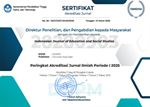Al Hakim, L., Ulfiah, U., Fahruroji, F., & Kosasih, U. (2022). Improving The Quality of Islamic Religious Education Learning through Revitalization of Teacher Deliberations of Islamic Religious Education Subjects. Journal of Social Science, 3(1), 103-114. https://doi.org/10.46799/jss.v3i1.282
Alfiah, N. (2020). Procedure for Development of Lesson Materials for Islamic Religious Education. AIUA Journal of Islamic Education, 2(2), 141-156.
Aris, A. S., Haqq, A. A., & Winarso, W. (2022). A Skill Application Model to Improve Teacher Competence and Professionalism. International Journal of Educational Methodology, 8(2), 331-346. https://doi.org/10.12973/ijem.8.2.331
Aris, A. S., Haqq, A. A., & Winarso, W. (2022). A Skill Application Model to Improve Teacher Competence and Professionalism. International Journal of Educational Methodology, 8(2), 331-346.
El Widdah, M. (2022). Madrasah Management Strategy as the Education Base for Religious Cadre. International Journal of Learning, Teaching and Educational Research, 21(11), 227-242. https://doi.org/10.26803/ijlter.21.11.13
Handayani, E. T., & Aminatun, D. (2020). Students'point of View on the use of Whatsapp Group to Elevate Writing Ability. Journal of English Language Teaching and Learning, 1(2), 31-37. https://doi.org/10.33365/jeltl.v1i2.602
https://doi.org/10.12973/ijem.8.2.331
Irby, B. J., Abdelrahman, N., Lara‐Alecio, R., & Allen, T. (2020). Epistemological Beginnings of Mentoring. The Wiley international handbook of mentoring: Paradigms, Practices, Programs, and Possibilities, 19-28. https://doi.org/10.1002/9781119142973.ch2
Jain, N. (2021). Survey Versus Interviews: Comparing Data Collection Tools for Exploratory Research. The Qualitative Report, 26(2), 541-554. https://doi.org/10.46743/2160-3715/2021.4492
Kosasih, A., Supriyadi, T., Firmansyah, M. I., & Rahminawati, N. (2022). Higher-Order Thinking Skills in Primary School. Journal of Ethnic and Cultural Studies, 9(1), 56-76. https://doi.org/10.29333/ejecs/994
Kumari, V., Hameed, D. S., Mazumder, D. L. K., & Sathyan, A. (2020). The Role of Education Leadership in Managing Teaching Competencies of Selected Secondary Teachers in the United Arab Emirates (UAE)(An Exploratory Study). International Journal of Management, 11(9). 21322
Muis, A., Eriyanto, E., & Readi, A. (2022). Role of the Islamic Education Teacher in the Moral Improvement of Learners. At-Tarbiyat: Jurnal Pendidikan Islam, 5(3). 56-64. https://doi.org/10.37758/jat.v5i3.487
Murkatik, K., Harapan, E., & Wardiah, D. (2020). The Influence of Professional and Pedagogic Competence on Teacher's Performance. Journal of Social Work and Science Education, 1(1), 58-69. https://doi.org/10.52690/jswse.v1i1.10
Muthrofin, K., Ikmal, H., & Wahyudi, W. E. (2023). The Implementation of Islamic Religious Education (PAI) in Shaping the Profile of Rahmatan lil alamin Students in a Madrasah. EDUCATIO: Journal of Education, 8(2), 370-381.
Nuland, S., (2020). Covid-19 and its Effects on Teacher Education in Ontario: A Complex Adaptive Systems Perspective. Journal of Education For Teaching, 46(4), 442-451. https://doi.org/10.1080/02607476.2020.1803050
Nurillayevna, A. F. (2022). Teaching Scientific Popular Articles in Mother Nili and Reading Literacy Courses. European journal of innovation in nonformal education, 2(3), 47-50.
Orland-Barak, L., & Wang, J. (2021). Teacher Mentoring in Service of Preservice Teachers’ Learning to Teach: Conceptual Bases, Characteristics, and Challenges for Teacher Education Reform. Journal of Teacher Education, 72(1), 86-99. https://doi.org/10.1177/0022487119894230
Stoeger, H., Balestrini, D. P., & Ziegler, A. (2021). Key Issues in Professionalizing Mentoring Practices. Annals of the New York Academy of Sciences, 1483(1), 5-18. https://doi.org/10.1111/nyas.14537
Stough, L. M., & Lee, S. (2021). Grounded Theory Approaches Used in Educational Research Journals. International Journal of Qualitative Methods, 2(1), 16094069211052203. https://doi.org/10.1177/16094069211052203
Strumińska-Kutra, M., & Scholl, C. (2022). Taking Power Seriously: Towards a Power-Sensitive Approach for Transdisciplinary Action Research. Futures, 135, 102881. https://doi.org/10.1016/j.futures.2021.102881
Sulaiman, J., & Ismail, S. N. (2020). Teacher Competence and 21st Century Skills in Transformation Schools 2025 (Ts25). Universal Journal of Educational Research, 8(8), 3536-3544. https://doi.org/10.13189/ujer.2020.080829
Sun, N., Wei, L., Shi, S., Jiao, D., Song, R., Ma, L., ... & Wang, H. (2020). A Qualitative Study on the Psychological Experience of Caregivers of Covid-19 Patients. American journal of infection control, 48(6), 592-598. https://doi.org/10.1016/j.ajic.2020.03.018
Winarto, W., Syahid, A., & Saguni, F. (2020). Effectiveness the Use of Audio-Visual Media in Teaching Islamic Religious Education. International Journal of Contemporary Islamic Education, 2(1), 81-107. https://doi.org/10.24239/ijcied.Vol2.Iss1.14
Zaini, A. W., Susilawati, S., & Astuti, R. N. (2022). Improving Student Learning Outcomes Through the Development of Videoscribe Sparkol-Based Learning Media. At-Tarbiyat: Jurnal Pendidikan Islam, 5(3).
 (Ministry of Religion, Probolinggo Regency)
(Ministry of Religion, Probolinggo Regency) 



